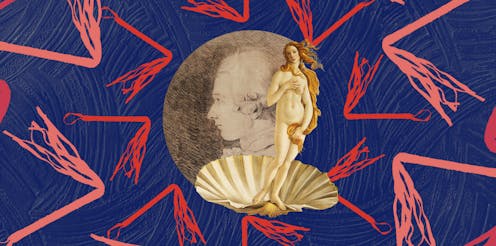The Marquis de Sade as feminist icon? Angela Carter’s surprising take on a notorious writer
- Written by Alexander Howard, Senior Lecturer, Discipline of English and Writing, University of Sydney

In our feminist classics series, we look at influential books.
Social constructs and questions of control are preoccupations the late British writer Angela Carter returns to time and time again. This is especially true of the inflammatory piece of feminist non-fiction Carter published in 1979: The Sadeian Woman: And the Ideology of Pornography.
Carter, who died from cancer in 1992, was a true creative trailblazer. A novelist, fabulist, journalist and editor, deeply influenced by the women’s movement of the 1960s, she played with genres from fairy-tales and science fiction to magic realism and radio drama. She is known for works such as The Bloody Chamber (1979) and Wise Children (1991).
Her work is eerily prescient and continues to resonate. The Passion of New Eve (1977), for instance, is a transgressive feminist novel set in a post-apocalyptic United States. Tellingly, Carter described this novel as an “anti-mythic” work about “the social creation of femininity”.
Two years later, she published her take on the French writer the Marquis de Sade (1740-1814). Commissioned by the feminist publishing house, Virago, The Sadeian Woman attempts the near impossible, claiming Sade as a proto-feminist author.
Read more: What are the four waves of feminism? And what comes next?
Fact from fiction
Novelist Francine du Plessix Gray has described Sade (whose real name was Donatien Alphonse François) as “one of the few men in history whose names have spawned adjectives” and “the only writer who will never lose his capacity to shock us.”
But who was he? Carter’s introductory note to The Sadeian Woman is useful:
Sade was born in 1740, a great nobleman; and died in 1814, in a lunatic asylum, a poor man. His life spans the entire period of the French Revolution and he died in the same year that Napoleon abdicated and the monarchy was restored to France. He stands on the threshold of the modern period, looking both backward and forwards, at a time when the nature of human nature and of social institutions was debated as freely as it is in our own.
Yet Carter neglects to mention Sade is one of the most notorious writers in recorded history.
Insane pornographer. Sexual pervert. Woman beater. Child rapist. Murderer. As the professor of French literature John Phillips has observed, these are “some of the more lurid labels” that have been attached – sometimes erroneously – to Sade over the last two centuries.



















